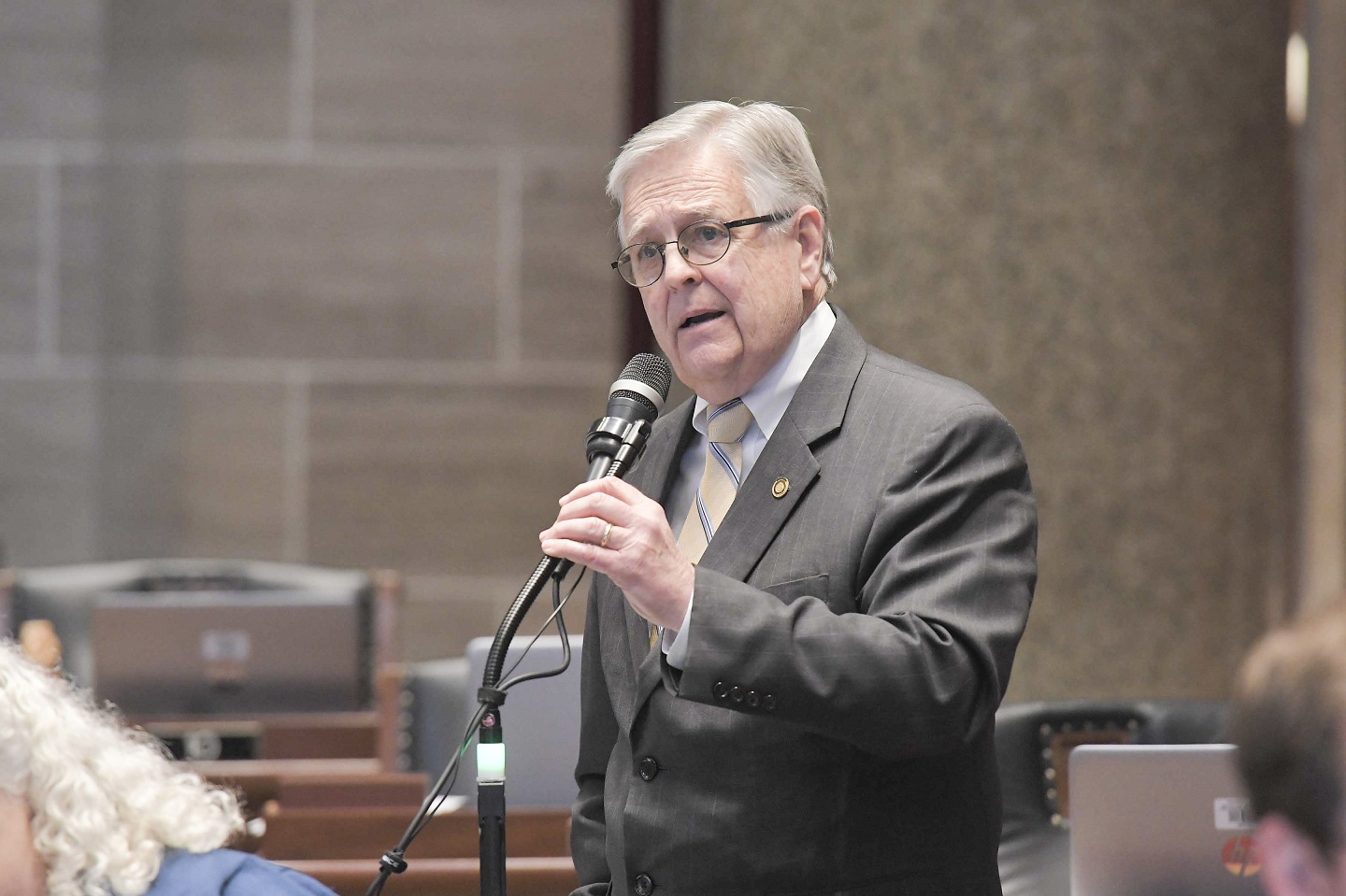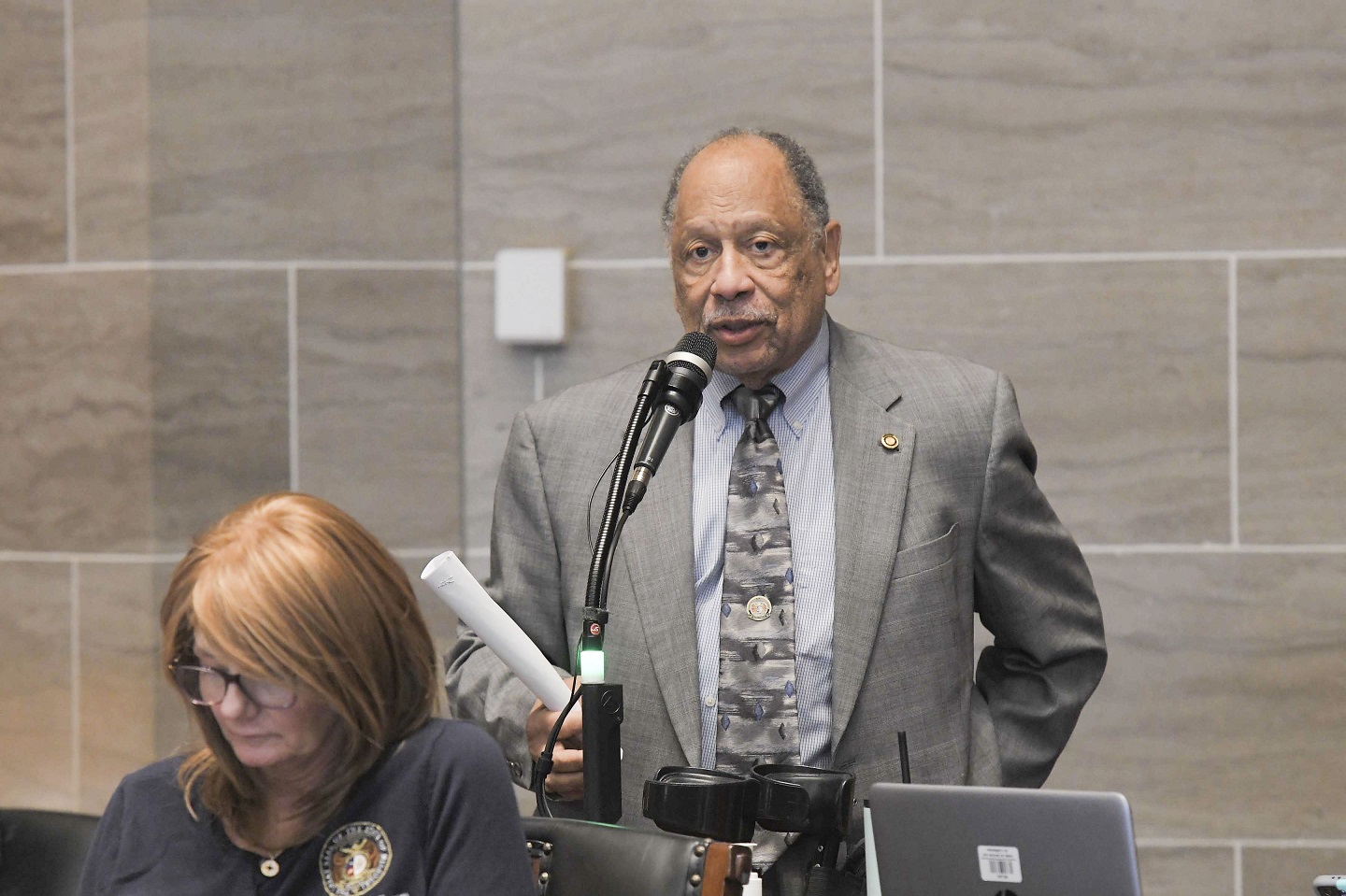University City Representative Joe Adams offered this farewell address on the penultimate day of the 2024 regular session, his last session in the House due to term limits:
Tag: Joe Adams
VIDEO: House Democrats media conference
House Democrats spoke to the media and took questions after the chamber ended its work for the week:
‘Land Bank Act’ seeks to boost revitalization of blighted areas, address housing shortage
The Missouri House has voted to allow the use of “land banks” in all parts of the state, so that more of Missouri can utilize them to restore neglected properties to use and public benefit.
Land banks are nonprofit entities that acquire, manage, refurbish, and resell stagnant properties so that they are again productive and useful. Such restoration benefits regions by eliminating blight, bolstering property values, reducing crime, and making more land available for residential or commercial purposes.
Missouri has land banks in St. Louis, Kansas City, St. Joseph, and Blue Springs. House Bill 2065, the “Land Bank Act,” would allow them to exist in all communities of 1,500 or more. They could also be established all Missouri counties except Jackson (which includes Kansas City) and Buchanan (which includes St. Joseph), effectively making them a possibility statewide. HB 2065 specifically deals with residential properties.
“People in the business understand the value of this because it impacts all the homes around it. It’s not just this property. You bring this one up, the other properties around it, now the properties around it, their value just went up. This is a good way to do it, to raise property values,” said bill sponsor Bill Owen (R-Springfield).
Owen said in those communities of fewer than 1,500, it makes more sense for the county to be the managing entity, “Because, quite frankly, you get into smaller communities, there’s just not the resources, and so we’re allowing the county to be able to be the entity, to be able to handle the transactional activity of a land bank.”
Owen said the option to have a land bank could be a game changer in rural parts of the state.
“Look at northern Missouri, look at the reduction in population. I remember when there were two congressional districts in northern Missouri, now there’s just one, we’ve had such a flood of people out of that area. We want to repopulate that,” Owen said. “With rural broadband there’s the opportunity now to go back, and so there’s a lot of properties up in rural Missouri that we need to repurpose, fix up, and help repopulate these rural, agricultural communities.”
One of the greatest functions of land banks is to “clean up” the titles of a given property. Neglected properties often have financial barriers that discourage buyers, things like liens, fines, or other fees. Land banks have some ability to clear these issues to make way for new ownership, and HB 2065 would build on that, “so that now someone’s going to be more interested in buying that property, because they’re not looking at it going, ‘Okay, how long is it going to take to clean that up, how much money is it going to cost?’ They’re going to start thinking about time, value of money and going, ‘There’s too many easy properties I can buy. Why would I mess around with this?’ and that is a big reason why so many of these properties go untouched. Nothing happens with them. They just sit there and continue to deteriorate.”
Owen said as important as any other aspect of HB 2065 are the new tools it would create, for the management of land banks. In part, they are provisions that are answers to the problems critics have had with existing land banks.
One such complaint has been that too many people involved with these entities have been “insiders,” such as people who sit on the bank’s board or are in an advisory capacity. HB 2065 would establish that no one within two degrees of consequenity can be involved in land bank transactions.
Another oft-heard complaint has been that speculators will buy property from land banks and then do nothing with them. HB 2065 gives buyers three years to redevelop and repurpose a property or turn it back over to the land bank. The bill would also allow that sales of properties be conditional to certain improvements being made. If that condition is not met, the land bank may sue the purchaser for damages and seek a foreclosure, under which the property would revert to the land bank.
HB 2065 received bipartisan support throughout its House journey. Representative Joe Adams (D-University City) said he was supportive when the bill came through the House Committee on Local Government, on which he is the top Democrat.
In his final remarks before the House voted on his measure, Owen noted a 2022 study that found that the average net worth of renters in the U.S. is $8,400, while the average net worth of homeowners is more than $216,000, most of that in the value of their homes. He told his colleagues, “If we are really serious about trying to bring people up, this is one way, not only can we improve neighborhoods, but we can instill net worth into these people, and to me that’s real social justice.”
The House voted 119-33 to send HB 2065 to the Senate.
Missouri House asked to consider multiple ethics reforms
House lawmakers continue to lay out a slate of proposed ethics reforms they believe would help restore the public’s trust in Missouri’s elected officials.

Columbia Democrat Kip Kendrick presented to the House Committee on General Laws, House Bill 217, an omnibus bill encompassing a series of measures offered by other members of his caucus. He said each proposed reform is based on promises made by candidates during the recent campaign cycle – promises that he says were endorsed by voters based on which candidates made those promises and won.
Two key provisions would build on work already done by the House toward ethics reform that House Democrats say they want to take farther than earlier proposals. One aims to ban gifts and monetary donations from lobbyists to elected officials.
Kirkwood Democrat Deb Lavender is carrying the Democrats’ version of a proposed gift ban, House Bill 212. She told lawmakers her bill would be tougher than House Bill 60, passed two weeks ago by the House.
Kirkwood Democrat Deb Lavender is carrying the Democrats’ version of a proposed gift ban, House Bill 212. She told lawmakers under House Bill 60, passed two weeks ago by the House, organizations could exploit a provision that lets them provide meals for legislators at events as long as all members of the General Assembly and all state lawmakers are invited.
The other provision proposes extending the prohibition on elected or appointed officials or legislators becoming lobbyists from six months to five years after their term has ended, and would apply that to certain legislative staff. It is also found in House Bill 213, sponsored by Representative Joe Adams (D-University City).
Other provisions in HB 217 propose prohibiting any candidates’ committees from transferring their funds to their candidate’s family members; requiring former candidates to dissolve their candidate committees; and letting the Missouri Ethics Commission prosecute criminal cases and initiate civil cases if the state Attorney General declines to pursue either regarding an alleged ethics violation. Those provisions are found in House Bill 214 (Tracy McCreery), House Bill 215 (Mark Ellebracht), House Bill 216 (Crystal Quade), respectively.

Republicans have their own proposals to further reform Missouri ethics laws. Ballwin Representative Shamed Dogan wants to ban gifts from lobbyists to local government officials.
Dogan said such officials are held to a much lower standard than legislators.
“I was an alderman in my city before being elected to this position, and we had a trash contract that was before our city. I subsequently found out, after we’d passed this trash contract on a no-bid basis, that our City Administrator had been lobbied by that trash company by taking him to game seven of the World Series in 2011,” said Dogan of his proposal, House Bill 229.
Republican Tom Hurst (Meta) presented House Bill 150, which would exempt individuals not paid to lobby from having to register or report as a lobbyist.
Hurst said he wants members of the public to know that they can talk to elected officials about issues that concern them without having to file as a lobbyist, and without fear of being prosecuted for failing to file.
Republican Jean Evans said the bill could raise more issues.
The committee has not voted on any of those bills.
House Speaker Todd Richardson (R-Poplar Bluff) and other legislative leaders have said ethics reforms would continue to be a priority in the 2017 session.

